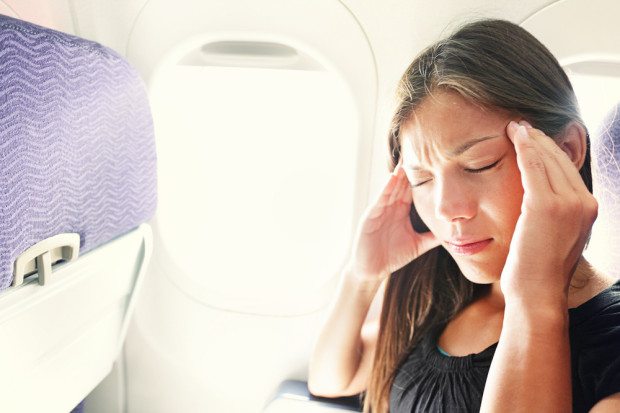Ear problems are the most common complaint of flight travelers. They are usually simple, like minor annoyances, result in temporary pain and blocked ear.
Eustachian tube, a membrane-lined tube 35 mm long that connects the back of the nose with the middle ear. The air in the middle ear is constantly being absorbed by its membranous lining and re-supplied through the Eustachian tube. In this manner, air pressure on both sides of the eardrum maintains equal. When, the air pressure is not equal the ear feels blocked.
When the middle ear pressure cannot be equalized, the air already there is absorbed and a vacuum occurs, sucking the eardrum inward and stretching it. Such an eardrum cannot vibrate naturally, so sounds are muffled or blocked, and can be painful. If the tube remains blocked, fluid will seep into middle ear to overcome the vacuum called “aero-otitis” (Fluid in the ear).
Symptoms:
- Ear pain
- Blocked ear
- Dizziness (vertigo)
- Bleeding or fluid coming from the ear, which can mean you have a ruptured eardrum
- Hearing loss
The most common cause for a blocked Eustachian tube is:
- Common cold.
- Sinus infections
- Nasal allergies.
- Air travel is associated with rapid changes in air pressure. To maintain comfort, the Eustachian tube must open frequently and wide enough to equalize the changes in pressure, especially while landing.
HOW WE CAN DO IT:
- Swallowing activates
- Chewing gum
- Sucking on hard candies.
- These are good air travel practices, especially just before take-off and during descent.
- Yawning is even better.
- Avoid sleeping during descent, because swallowing may not occur often enough to keep up with the pressure changes.
Babies: cannot intentionally pop their ears, so feed the baby during the flight, and do not allow him or her to sleep during descent.
Children are especially vulnerable to blockages because their Eustachian tubes are narrower than in adults.
Use of medications: Travelers with allergy problems should take their medication at the beginning of the flight for the same reason.
Tips to prevent discomfort during air travel:
- Postpone an airplane trip if a cold, sinus infection, or an allergy attack is present.
- Patients in good health can take a decongestant pill or nose spray approximately an hour before descent to help the ears pop more easily.
- Avoid sleeping during descent.
- Chew gum or suck on a hard candy just before take-off and during descent.
- If the ears fail to open or if pain persists, seek an ENT specialist opinion.

